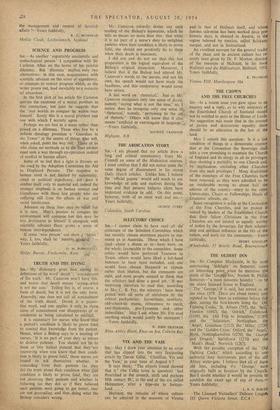SCIENCE AND PROGRESS
SIR,—As another ' regrettably unscientific and untheological person' I sympathise with Sir Carleton Allen on the horns of his painful dilemma. But dilemma' implies only two alternatives: in this case, acquiescence with scientific advance on the score of expediency, or attempts to restrict progress which, as the writer points out, lead inevitably to a reductio ad absurdum.
In the first part of his article Sir Carleton queries the existence of a moral problem in. this connection, but later he suggests that the ' real worlds to conquer lie within man himself.' Surely this is a moral problem and one with which t warmly agree.
Perhaps we are lost in a maze rather than poised on a dilemma. Those who live by a definite theology postulate a Guardian in the Tower' at the centre of things w„ ho will, when asked, point the way out. Thhse of us who claim no certitude as to the tnal answer must seek a way through co-operation instead of conflict in human affairs.
Some of us feel that a light is thrown on the road by the Adoption Committee for Aid to Displaced Persons. The response to human need is not limited by nationality, creed or political expediency, nor • does it confine itself only to material aid, indeed the stronger emphasis is on human contact and friendliness with these lost people who are suffering still from the effects of war and racial intolerance. Advance on these lines may be sdatil but it is sure. Man's paSsion to conquer his environment will continue but this may he less destructive to himself if alongside with scientific advance there grows a sense of human interdependence.
If some ' wise person' can show a ' better' way, I, too, shall be ' humbly grak:ful • Yours faithfully,
0. M. not.pl Hedge Barton, Fordcombe, Kent


































 Previous page
Previous page